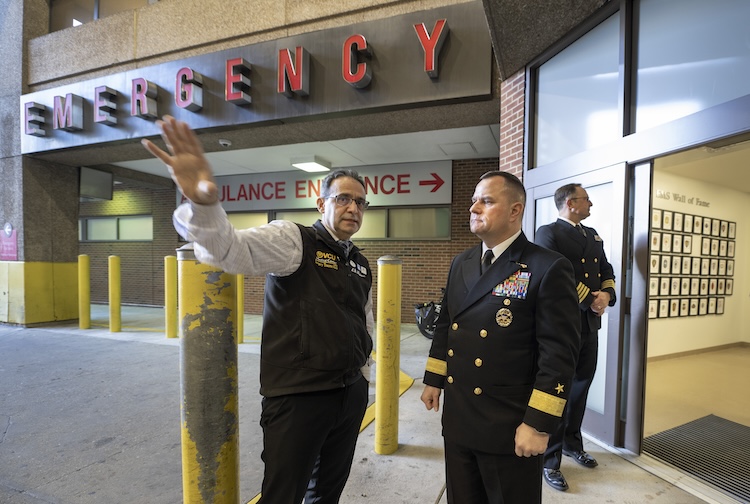
VCU Health joins national clinical trial to improve treatments for severe traumatic brain injury
In collaboration with 45 institutions across the U.S. and Canada, VCU Health will assess the clinical impact of different strategies for treating brain injuries in emergency situations.
April 05, 2023 Traumatic brain injuries affect 3.5 million people in the United States each year and are one of the most common causes of disability and death in adults. (Getty Images)
Traumatic brain injuries affect 3.5 million people in the United States each year and are one of the most common causes of disability and death in adults. (Getty Images)
By Olivia Trani
VCU Health has been chosen to join a national $32 million clinical trial to improve patient outcomes following severe traumatic brain injury (TBI). The study is funded by the National Institutes of Health.
Each year, approximately 3.5 million people in the United States sustain a TBI. Some instances of brain injury are mild, with symptoms lasting a few weeks or months. However, a severe injury can result in life-long disability or death. According to the Centers for Disease Control and Prevention, there are approximately 300,000 hospitalizations and 50,000 deaths every year due to TBI, making it one of the most common causes of disability and death in adults.
“In the past 50 years, there has been very little progress in terms of improving treatments or making new pharmaceutical discoveries for severe TBI,” said Lisa Merck, M.D., a professor and vice chair of research in the Department of Emergency Medicine at the VCU School of Medicine. “Through this clinical trial, we hope to shed new light on which practices make a meaningful difference for our patients.”
VCU Health has been a federally designated TBI Model System of Care since 1987, offering comprehensive lifetime clinical services to patients across the region and collaborates in a nationwide system of researchers to provide cutting edge care solutions. VCU Health’s TBI programs include inpatient and outpatient rehabilitation services to support a seamless return to the community.
The Brain Oxygen Optimization in Severe TBI Phase 3 trial (BOOST3) will look into the effectiveness of two strategies used to treat patients with severe TBI. One approach is to monitor changes in pressure in the head from brain swelling. The other is to monitor both pressure and blood oxygen levels in the brain.
When a person sustains a traumatic brain injury, blood and cerebrospinal fluid can build up around the brain, increasing the pressure inside the skull. Not only does this swelling increase the risk of additional injury, but it also can obstruct blood flow to the brain. This in turn prevents oxygen from reaching brain cells. Oxygen is essential for brain cells to function, and without it, the cells can die within minutes.
Using a small microelectrode, health care professionals can measure pressure and blood oxygen levels inside the skull. Tracking such conditions helps doctors adjust their treatment plan, including determining the kinds and doses of medications and the amount of intravenous fluids given, ventilator settings, the need for blood transfusions and other medical care.
Such electrodes, which are placed in the brain tissue, are FDA-approved and deemed safe to use when treating patients with severe TBI. However, this study will give a more comprehensive understanding of how they impact patient recovery.
“We know from prior research that keeping a patient’s intracranial pressure below a certain range improves clinical outcomes, but there has never been a randomized controlled trial looking into whether adding cerebral oxygenation-guided therapy results in improved outcomes,” Merck said.
In this clinical trial, half of the enrolled patients will have their treatment solely guided by pressure levels inside the brain. The other half will have their treatment guided by both pressure and blood oxygen levels. In the six months following treatment, the researchers will examine the clinical outcomes of both patient groups, including a patient’s ability to care for themselves and perform daily activities.
The strategies being studied typically need to start within two to ten hours of injury. As such, some patients will be enrolled without consent if a family member or other representative is not readily available. This provision of federal regulation, called “exception from informed consent,” only applies when the patient’s life is at risk, when time is of the essence and when informed consent is not feasible – such as when a patient is in critical condition. When a patient’s family or legal authorized representative is available, informed consent to participate or continue in the clinical trial is requested.
“A severe traumatic brain injury is a life-threatening condition requiring immediate treatment. In this kind of situation, every minute matters to preserve brain tissue,” Merck said. “This exemption will allow us to better understand which treatment strategies are the most effective at saving people’s lives and improving clinical outcomes.”
Merck and her team have been holding community forums, talking with focus groups and attending public gatherings in Richmond to raise awareness of the study, answer questions and allow opportunities for public comment.



